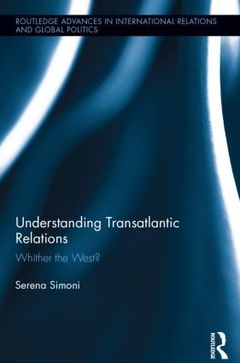Understanding Transatlantic Relations Whither the West? Routledge Advances in International Relations and Global Politics Series
Auteur : Simoni Serena

In light of the Arab Spring and after days of public quarreling that highlighted the divisions among NATO?s members on an agreement to give command of the "no-fly" zone in Libya to the Alliance, it is evident that the U.S. is having problems engaging with its European allies and partners. Why is this happening?
Breaking away from the conventional way to study transatlantic relations, Serena Simoni uses a Constructivist theoretical lens to argue that the transatlantic partners? changing identities since the early 1990s have influenced their political interests and, as a consequence, their national security policies. Contemporary divergences are a notable byproduct of these transformations. By focusing on cases of disagreement (i.e., NATO?s enlargement, the International Criminal Court, and Debt Relief for Africa), this book shows how since the 1990s, the US has started to see itself as the actor carrying the international defense burden, while the European Union has developed an image of itself as the actor in charge of humanitarian efforts, which generally entails diplomacy rather than military efforts. Contemporary cases of disagreement as the Arab Spring, Libya, and Foreign Assistance in Africa illustrate how redefined national identities continue to alter the course of transatlantic relations.
Understanding Transatlantic Relations provides a more accurate examination of the future of transatlantic relations and offers an understanding of those issues that the United States and Europe would consider important enough to justify their cooperation.
Part I. 1. Introduction 2. The changing security context 3. Theories of Transatlantic Relations Part II.Transatlantic Relations from the end of the Cold War to 9/11. 4. NATO’s enlargement: the United States moves forward regardless of European anxiety 5. The International Criminal Court: Europe goes on in spite of American distress 6. Debt Relief: Transatlantic Disconnected Advancement to Forgive Africa’s debt Part III. Transatlantic Relations from 9/11 to today. 7. The Arab Spring: A Missed Opportunity for a Common Transatlantic Agenda 8. Libya: What to do? Finding National Solutions to International Problems 9. Foreign Assistance for Africa: Europe’s Defense of its Programs. A Vital Element of Identity and National Security. Conclusion. 10.Transatlantic Relations: A Process of Redefinition with an Uncertain Outcome
Serena Simoni is Assistant Professor of Political Science at Samford University.
.
Date de parution : 06-2013
15.6x23.4 cm
Date de parution : 08-2015
15.6x23.4 cm
Thème d’Understanding Transatlantic Relations :
Mots-clés :
Transatlantic; NATO; International Relations; Constructivism; Realism; Neo-realism; Euro-American relations; United States; Europe; International Criminal Court (ICC); International security; Post-cold War; International Monetary Fund (IMF); World Bank (WB); Ronald Inglehart; Heavily Indebted Poor Countries (HIPC); NATO Meeting; NATO Air Strike; NATO’s Role; NATO’s Military Operation; African Development Bank; NATO’s Enlargement; International Humanitarian Law; NATO’s Operation; NATO Member; Military Expenditure; ICC Treaty; Understanding Transatlantic Relations; NATO Structure; HIPC Initiative; Transatlantic Relations; NATO’s Military; Global NATO; Unsustainable Debt Burdens; NATO’s Energy; NATO’s Military Intervention; Debt Relief; NATO Headquarter; NATO’s Evolution; NATO’s Response; NATO’s Transformation



